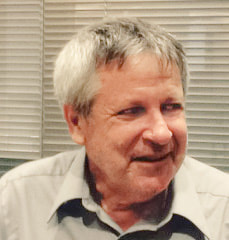The Death of Pierre
|
|
I learned about the death of Pierre (I think that was his name) by phone, the same way I learned about my mother’s death and, before that, the death of my father. When Dad died I was with Mom, but when she died I was alone.
The phone rang at one of those direful hours, five or six in the morning—a portent of bad news. The nurse said, “Your Mom’s vital signs have stopped.” When I got off the phone I cried for twenty minutes. As I regained my composure, I began contacting family members and making funeral arrangements. I was alone when I learned about Pierre’s death. I’m pretty sure that was his name. I should remember since I attended the funeral. This time the call comes from Deborah. She’s weeping uncontrollably. “I think I killed him.” “What happened?” Between sobs, she explains, “I wrapped him up in a blanket and was holding him close while watching TV and…and he just stopped breathing. Do you think I killed him?” “No, Deborah, I don’t think so. You told me he was having respiratory problems, and that you took him to the vet. It was just his time.” But she keeps repeating, between sobs, “Do you think I killed him?” “I don’t think so. I wasn’t there,” I add lamely. Hamsters don’t live long, but their hearts, apparently, beat much faster than human hearts. Maybe that means a hamster’s life, beat for beat, is equal to a human life. Deborah’s friend Lydia came to the funeral with her adopted daughter. Just the four of us were in attendance. My job that day was to dig a grave outside Deborah’s condo where her other little guys are interred. Lydia recited the Hebrew prayer for the dead. Deborah read a little poem she composed for her tiny friend. But life goes on. Old friendships recede, dissolve, new ones emerge—or don’t. Deborah’s newest little guy is called Anatole Pierre Galileo. Her students at Tehiya Day School, who love him very much, gave him his surname. |
1
|
Anatole and I became thick as thieves when Deborah placed him in my care for ten days. When I approach her condo in Berkeley, I call on my cell. Sometimes I say, “I’d like to speak to Anatole Pierre Galileo, please.” I think she and I now talk more about Anatole than about each other.
I was at her place a few months ago. When I asked whether she was going to get a dog this year, she whispered, “Don’t speak so loud; I don’t want Anatole to overhear.” The last time I saw her was at my place. I choose the movie this time, A Late Quartet (2012). In the film, the Fugue Quartet, founded by cellist Peter Mitchell (Christopher Walken), is preparing to play Beethoven’s String Quartet in C# Minor, Opus 131 for their 25th Anniversary Concert. When Mitchell speaks of performing Opus 131, he’s implicitly speaking as well about the members of the Quartet whose personal relationships are disintegrating. “What are we supposed to do?” he asks. “Stop? Or struggle to continuously adjust to each other up to the end, even if we are out of tune?” My head snaps back in disbelief when Deborah gets up to leave before the end credits finish running. I do not attempt to dissuade her from leaving, as she says, “That was a good film,” and places three dollars on the dining room table as her portion of the rental. After 25 years—no other word spoken—we part. All those hours spent together, years—too many. Did we ever come to know each other? Were we ever in tune? Our darkest confessions on deaf ears falling. Is it time to stop? One of the great consolations of Opus 131, composed when Beethoven was entombed in a silent world, is that it has a beginning, middle and end, and unity in the midst of extreme dissociation—unlike life, which makes no sense at all. Adagio, ma non troppo e molto espressivo. (Slow, but not too, and very expressive.) So read Beethoven’s instructions for the opening fugue that ushers us into an unknown world of a sombre and terrible beauty, of heartbreaking sadness searching, feelingly, for break of day, traversing nearly every key in the minor mode, a tonal world of vibrating waves weaving themselves seamlessly into an eternal moving tapestry of sound the composer could not hear. A long time ago, someone, who must have loved me very much, stitched out of midnight blue and crimson red cloth a quilt of the opening measures of this Magnum Opus. After all these years—decades—the lovingly crafted gift still hangs on the wall above the piano we bought together. I sit down at the piano, looking up at the quilt. As I pick out Beethoven’s plaintive melody on the out-of-tune Chickering, the consolation of the greatest achievement of art seems wholly inadequate to the utter shapelessness of life. I doubt I’ll be invited to Anatole’s funeral. 5-2013 Rev. 8-2018 |
2
|
About Don Plansky
click to read BIO
|
Please Comment
click to open a comment box |




